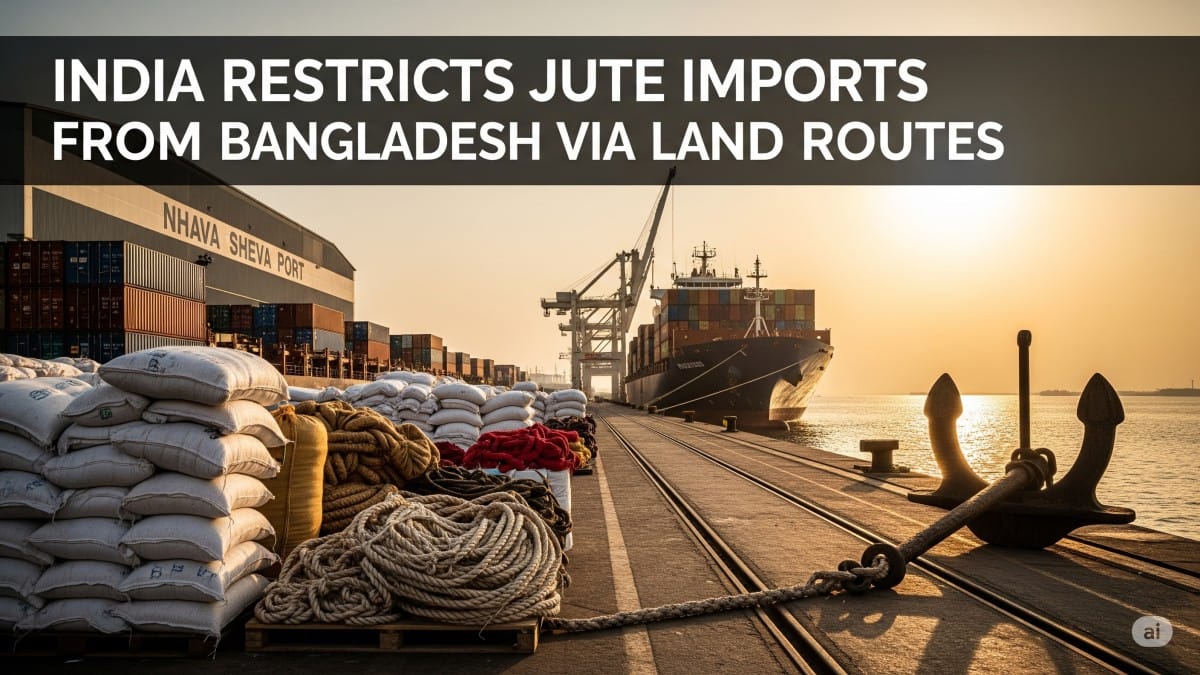
New Delhi – The Government of India has imposed strict port restrictions on jute imports from Bangladesh, barring the entry of certain jute products through land routes on the India-Bangladesh border. According to Notification No. 24/2025-26 issued by the Directorate General of Foreign Trade (DGFT), these products will now be allowed into India only via the Nhava Sheva Seaport in Maharashtra, with immediate effect.
The decision applies to a range of jute-based goods, including:
- Bleached and unbleached woven fabrics of jute or other textile bast fibre (HS Code 531090).
- Twine, cordage, rope, etc. of jute (HS Code 560890).
- Twine, cordage, rope, and cables (HS Code 560790).
- Sacks and bags of jute (HS Code 630510).
The DGFT clarified that jute imports from Bangladesh through any land port will no longer be permitted, with the Nhava Sheva Port being the sole entry point. This measure follows earlier notifications No. 07/2025-26 (dated 17 May 2025) and No. 21/2025-26 (dated 27 June 2025) and is aimed at regulating trade, ensuring quality control, and protecting India’s domestic jute industry.
Reason Behind the Restriction
Officials suggest that the move could be driven by concerns over quality standards and the need to shield local jute producers from low cost imports. India has one of the largest jute industries in the world, employing millions, particularly in West Bengal and Assam. Increased jute imports from Bangladesh in recent years have been a point of contention, with domestic producers claiming unfair pricing and quality issues.
Impact on Trade
The restriction will likely impact cross-border traders who have so far relied on land routes for quicker and cheaper transportation. With imports now being routed only through Nhava Sheva, logistical costs and transit times are expected to increase. This could potentially make imported jute products more expensive in the Indian market.
Industry Reaction
While traders importing from Bangladesh are concerned about increased operational costs, Indian jute manufacturers have welcomed the decision. Industry bodies believe that restricting jute imports from Bangladesh will help boost domestic sales and maintain fair competition.
The DGFT has stated that all other terms and conditions of Notification No. 21/2025-26 remain unchanged, ensuring continuity in existing trade regulations apart from the new port restriction.
With this move, India has sent a strong message about its intent to safeguard local industries while ensuring compliance with quality norms in the jute sector.
Stat connected with The News Drill for more updates.
FAQs
Q1. What are the new restrictions on jute imports from Bangladesh?
Imports through India-Bangladesh land ports are banned; only Nhava Sheva Port is allowed.
Q2. Which jute products are affected by the restriction?
Jute fabrics, twine, cordage, rope, cables, sacks, and bags.
Q3. Why has India restricted jute imports from Bangladesh?
To ensure quality control and protect India’s domestic jute industry.
Q4. When will the restriction take effect?
The restriction is effective immediately from August 11, 2025.
Q5. Will this affect traders and prices?
Yes, it may increase transportation costs and product prices due to longer transit routes.
















